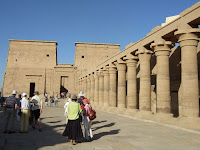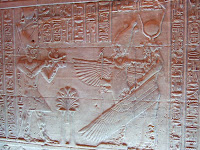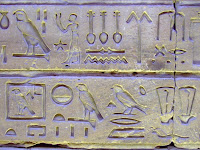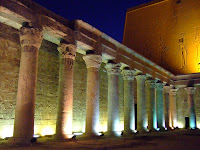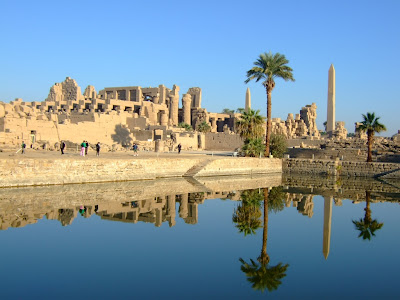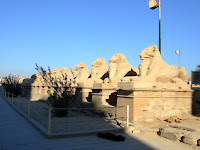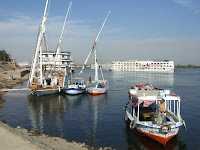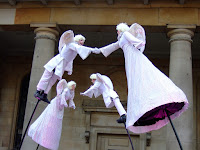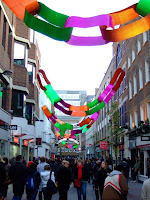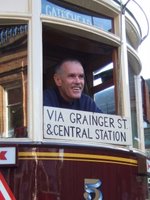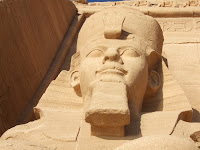 This morning's wake-up call was at the unsociable hour of 0340 so that we could be on the coach at 0415 ready to join the convoy at 0430. After the 1997 massacre the authorities are taking no chances with their most precious commodity, the tourist. The 280km trip from Aswan to Abu Simbel is made in convoys under armed guard. For some reason, although we appeared to be the last
This morning's wake-up call was at the unsociable hour of 0340 so that we could be on the coach at 0415 ready to join the convoy at 0430. After the 1997 massacre the authorities are taking no chances with their most precious commodity, the tourist. The 280km trip from Aswan to Abu Simbel is made in convoys under armed guard. For some reason, although we appeared to be the last  coach to arrive we were the convoy leader and as soon as the guard had joined us we set off across the featureless waste to Abu Simbel; bizarrely on the wrong side of the road most of the way.
coach to arrive we were the convoy leader and as soon as the guard had joined us we set off across the featureless waste to Abu Simbel; bizarrely on the wrong side of the road most of the way.30 minutes before arrival the tour leader woke us so that we had time to eat something from the 'breakfast box' that we had each been given as we left the boat and it also gave us the opportunity to watch a totally unspectacular sunrise over the Sahara.
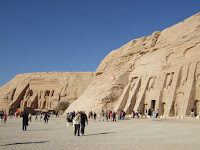 Abu Simbel was packed with tourists but different in that it was carved form rock rather than built from stone. The story of its rescue from the rising waters of Lake Nasser and its repositioning 64m higher and 280m back from the original location is quite inspiring. Unfortunately, photos are not permitted inside the temple; a prohibition rigorously enforced by the numerous attendants inside the two temples.
Abu Simbel was packed with tourists but different in that it was carved form rock rather than built from stone. The story of its rescue from the rising waters of Lake Nasser and its repositioning 64m higher and 280m back from the original location is quite inspiring. Unfortunately, photos are not permitted inside the temple; a prohibition rigorously enforced by the numerous attendants inside the two temples.The 2.5-hour trip back to Aswan was a chance to catch up on some of the lost sleep before we arrived for lunch. Quite why we had to join the 0430 convoy when, clearly, there were later convoys running at civilised times is anyone's guess.
 After lunch it was time for our felucca ride up around Lord Kitchener's Island and back to the boat. Part way round we were 'ambushed' by a young boy in a hand-paddled 'canoe' who pulled up alongside and sang various well known English songs and then, at the request of our tour leader, a 'national song' from France, Italy, Spain, Germany, Japan and so on. Pokarekare ana was not in his repertoire. Having been tipped for his vocal prowess he then paddled off flat-stick looking for another boatload of tourists.
After lunch it was time for our felucca ride up around Lord Kitchener's Island and back to the boat. Part way round we were 'ambushed' by a young boy in a hand-paddled 'canoe' who pulled up alongside and sang various well known English songs and then, at the request of our tour leader, a 'national song' from France, Italy, Spain, Germany, Japan and so on. Pokarekare ana was not in his repertoire. Having been tipped for his vocal prowess he then paddled off flat-stick looking for another boatload of tourists.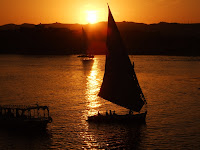 With a little spare time before dinner we decided on a walk through the souk; quite a disappointment after the bazaars of Cairo and the souks of Morocco so we returned to the boat to catch a sunset on the Nile.
With a little spare time before dinner we decided on a walk through the souk; quite a disappointment after the bazaars of Cairo and the souks of Morocco so we returned to the boat to catch a sunset on the Nile.




